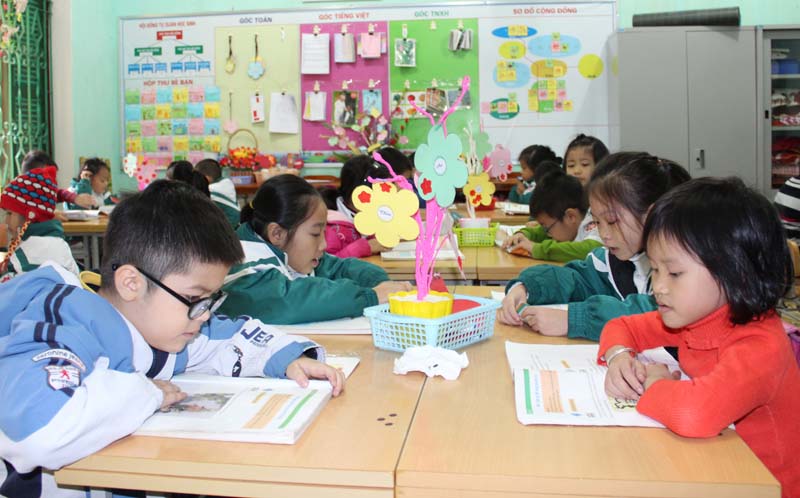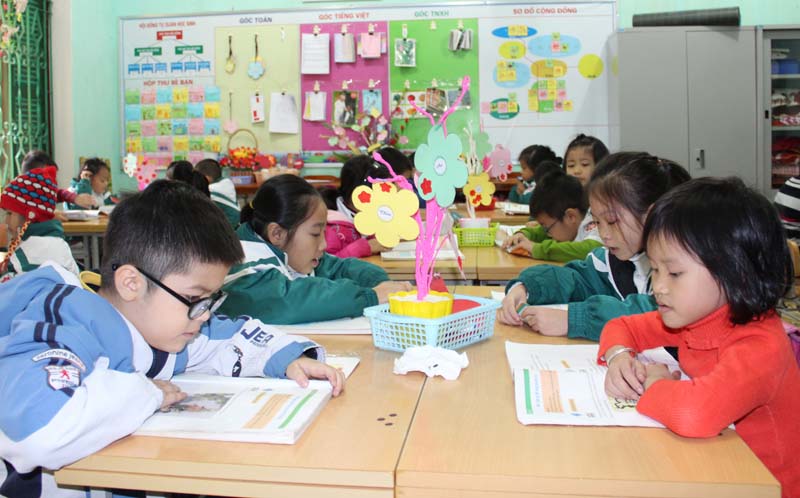
(HBO) – There are 58 out of 84 local primary schools in Hoa Binh province meeting national standards, accounting for 69 percent. Of them, 51 meet level 1 while the remaining level 2.
Mai Chau elementary school in
Mai Chau district meets national standards.
While building primary schools up to national
standards, the province met difficulties such as 86 out of 210 communes living
in especially poor situation, accounting for 40.9 percent, and unfavourable conditions
for socio-economic development.
Nguyen Thi Hong Diem, head of the elementary
education office from the provincial Department of Education and Training, said
schools worked closely with parents to care for students. Schools’ parent
boards have pooled public support to improve infrastructure and teaching
conditions. Several localities reaped achievements in the effort such as Ky Son
100 percent, Yen Thuy 78 percent, Tan Lac 69 percent and Luong Son 67
percent.
Over the past two decades, infrastructure in
local schools has been upgraded, from campuses to facilities and equipment.
Improving infrastructure positively impacts task fulfillment and education
results, thus meeting demand for education-training cause. The campaign on
building national-standard schools is not only the task of education sector but
also welcomed by the political system and local people.
Many wards, communes and townships have increased
land funds for schools to help them meet national standards. Each academic
year, the province has additional 5-8 primary schools meeting national
standards.
Apart from achievements, several shortcomings
still exist such as slow construction. Over the past two decades, 86 primary
schools have met national standards, accounting for 65.2 percent. Investment in
building national-standard elementary schools in several districts is
unbalanced. The rate of national-standard elementary schools is low in several
localities such as Da Bac (33 percent), Lac Son (40 percent) and Kim Boi (44
percent)./.
The emulation movement "Hoa Binh joining hands to build new-style rural areas” has been widely spreading, becoming a driving force that motivates the localities to renew rural landscapes and improve the material and spiritual lives of the residents. In this movement, the people play a central role-both as the main implementers and direct beneficiaries of its outcomes.
In response to the global digital revolution, Hoa Binh Newspaper is transforming itself into a modern and multi-platform media hub, blending cutting-edge technology with a restructured newsroom and a new generation of tech-savvy journalists.
Hoa Binh province’s Association of the Elderly recently held a conference to review the project on expanding the inter-generation self-help club model until 2025.
In a move to implement Resolution No. 57-NQ/TW, issued on December 22, 2024 by the Politburo, which targets breakthroughs in science-technology development, innovation, and digital transformation, the Hoa Binh provincial Department of Health has issued a plan to roll out the "Digital Literacy for All” campaign within the local health sector.
An Nghia Commune (Lạc Sơn District) is one of the communes that achieved the tha standard of the national new rural area in 2018. Entering a new development phase, the commune is now trying to meet the criteria for the advanced new rural development. With the strong political will and the public consensus, the commune is gradually overcoming the challenges to reach this goal, aiming for the sustainable development.



